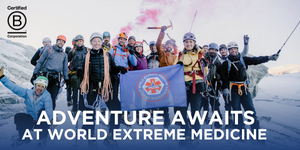Elana St George, 4th Year Medical Student, Newcastle University
Wilderness Medical Training (WMT) is a UK-based company that have been providing expedition medical training courses for doctors, allied health professionals, and non-medics for 30 years. WMT runs a number of different courses each year varying from ski-touring in Norway to more classroom-based teaching at home, all with a focus on medical care in remote settings.
Unfortunately, due to the Covid-19 pandemic, overseas courses have been put on hold in 2021. However, WMT have introduced a new ‘Adventure Medicine’ course held in the Lake District as a domestic alternative.
Key Facts
What? An active five-day programme including two exploratory mountain training days and a one-day Canadian canoe expedition on Ullswater.
When? Dates in 2022 are: 8 – 12th June and 20 – 24th July. (Bookings will be taken from October 21).
Where? Watermillock/Patterdale Village Halls, Penrith.
How much? £750 (Includes: four nights camping, parking, in-course minibus transport, and all meals).
Qualification/Accreditation: At least 15 hours CPD. Certificate of attendance issued.
Delegates: Open to medical students, nurses, doctors, OHPs, and non-medics.

The Course
The Adventure Medicine course is taught by a fantastic team of doctors and non-medical instructors – all with extensive knowledge and each with their own inspirational stories. They are very approachable and willing to provide invaluable advice on how to take your first steps into the world of expedition medicine.
A variety of pre-course information is provided including a comprehensive kit list and contact for Barry Roberts (WMT director) who is very efficient at replying to any queries. A WhatsApp group of delegates is created leading up to the course enabling introductions and coordinate lift-sharing.
Watermillock Village Hall is nestled beside the beautiful Ullswater in the Northern Lake District, and travel to the campsite is straightforward. There are regular trains to Penrith station and lifts can be arranged from the station to the campsite. Camping for the duration of the course ensured a Covid-secure environment as well as providing a real taste of expedition life. Tent hire is also available from £30 for the duration if required.
Menus provided plenty of options for breakfast and lunch to keep everyone well-fuelled for the action-packed days. Evening meals are prepared by delegates, which provides the opportunity to muck-in together and build that true expedition-style camaraderie!

Course Content
On arrival, delegates are provided with a WMT Handbook covering almost every expedition-related medical issue you could think of. The course covers a vast array of content, split into three main components:
Expedition medicine: trauma, rescue, thermal injury, etc
Technical mountain skills: navigation, route planning, SOS beacons.
Fieldcraft skills: fire lighting, tarp erecting, wild bread making.
The medical-based tuition varies daily with a mix of interactive classroom sessions as well as simulation-style sessions taking place out in the mountains and on the lake.The lectures cover a wide range of topics such as; common expedition-related medical conditions, how to plan an expedition, what to pack in your medical kit, and how to pursue a career in expedition medicine.
Out in the field, we learned how to correctly splint and bandage patients; as well as techniques to safely escort injured patients off the mountain. Completing these scenarios out of the comfort of a hospital setting emphasises how even the simplest of medical interventions can become complicated with limited resources. A variety of non-medical related skills are also taught, such as how to operate a handheld GPS, navigational skills using map and compass, and basic mountaineering rope- work.
One day we were able to explore the beautiful Ullswater by canoe under the expert guidance of Ben and Mieps from Adventure Element. During this day we learned basic bush-craft skills and cooked up some delicious bannock bread on campfires. Dr. Duncan Gray also delivered a lakeside session on jungle survival skills; including how to insect-proof your hammock and avoid the dreaded ‘jungle foot’!
In the evenings, we were entertained by a series of inspirational talks from the course instructors themselves. Cumulatively, their inspirational presentations demonstrated the pure breath of adventures to be had within the realms of expedition medicine.
And finally, the course culminated in the ascent of Helvellyn along the famous Striding Edge route enabling all the skills learnt to be put into practice, and celebrate the end of the week!

The Verdict
I was worried before attending the course that I may have had less experience and knowledge compared to other delegates, however after discussion with the other delegates it was unanimous that the medical content taught throughout the week was pitched at an appropriate level, and irrespective of medical grade or prior experiences.
After our action-packed days, there was still time to unwind in the evening and share stories over some well-deserved drinks around the campfire. On the final night, we were even treated to live music by some talented delegates and WMT’s very own Barry Roberts. I, alongside some of the other delegates, even managed to stay up for a sunrise swim in the lake!
I would highly recommend this course – it was a great opportunity to meet like-minded people and I now feel more confident to take my first steps towards a future in expedition medicine. The week certainly was an adventure! A massive thank you to all of the WMT instructors; Barry Roberts, Dr Duncan Gray, Dr Shona Main, Dr Alex Taylor, Heather Morning (as well as associates Ben Keen and Mieps Dekker from The Adventure Element) for making the week such a great experience!








